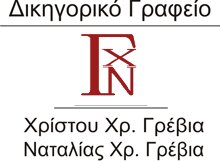Best Juvenile Law Lawyers in Arta
Share your needs with us, get contacted by law firms.
Free. Takes 2 min.
List of the best lawyers in Arta, Greece
About Juvenile Law Law in Arta, Greece
Juvenile law in Arta operates under national Greek legislation applied locally by the Arta courts, prosecutors, police, and social services. It covers situations where a minor is suspected of committing an offense, when a child is a victim or witness, and when child protection or welfare measures are needed. The approach is child-centered and aims to educate and rehabilitate rather than punish, with strong safeguards for privacy and procedural rights.
Arta has a Court of First Instance and a Prosecutor for Minors that handle juvenile matters. Police investigations involving minors follow special procedures, and hearings are typically held behind closed doors to protect the child. Non-criminal issues such as abuse, neglect, or urgent protection needs can also be addressed quickly by the Juvenile Prosecutor and the civil courts.
This guide is informational only and does not replace advice from a licensed attorney in Greece.
Why You May Need a Lawyer
You may need a juvenile law lawyer in Arta if any of the following apply:
- A minor has been detained, arrested, or called in by the police for questioning.
- Your child is accused of an offense at or outside school and you are unsure about rights and next steps.
- The Juvenile Prosecutor has contacted your family, social services are involved, or there is talk of protective or educational measures.
- A child is a victim or witness of a crime and needs protection, representation, or safe reporting.
- You received a court summons for a juvenile hearing or need to challenge bail, pretrial restrictions, or detention.
- There are concerns about abuse, neglect, custody, or urgent removal of a child from a home environment.
- You want to explore diversion, mediation, community service, or other alternatives that avoid a lasting record.
- You need help sealing or understanding the impact of juvenile records on education and employment.
Local Laws Overview
Definition of minor and age brackets: Greek law treats persons under 18 as minors. In juvenile matters, younger and older minors are handled differently. Generally, younger minors are subject to educational or protective measures, while older minors can face stricter consequences for serious offenses, always with a focus on rehabilitation.
Authorities in Arta: Juvenile investigations and prosecutions are handled by the Prosecutor for Minors at the Arta Court of First Instance. Hearings take place before the Juvenile Court, which is a specialized formation of the local court. The Hellenic Police in Arta follow child-appropriate procedures, and the Probation Service for Minors and local social services support the court with assessments and supervision.
Police procedures and questioning: When a minor is questioned as a suspect or witness, the police must notify parents or guardians and respect child-sensitive interviewing rules. A lawyer for the minor is strongly recommended. Social workers or psychologists may participate to safeguard the minor’s wellbeing, and interviews are conducted with special care.
Pretrial measures: Instead of detention, courts usually favor educational or supervisory measures such as curfews, school attendance, counseling, probation, or community service. Detention for minors is exceptional, reserved for serious felonies, and subject to strict legal limits and judicial review.
Outcomes and measures: The Juvenile Court prioritizes educational and therapeutic measures. For serious offenses by older minors, custody in a special youth facility may be imposed, but only when strictly necessary. Compliance-based outcomes and restorative approaches are encouraged where appropriate.
Privacy and closed hearings: Juvenile hearings are not public. Identities and records of minors are protected. Records are kept confidential and used in a limited way, with rules that restrict disclosure and help prevent long-term stigma.
Victims and witnesses: Child victims and witnesses benefit from protective measures, including privacy protections, special interview settings, and support services. Applications for restraining or protective orders can be made when safety is at risk.
Child protection without criminal charges: The Juvenile Prosecutor can take urgent measures to protect a child in cases of neglect or abuse, including temporary placement, medical examinations, or social service involvement. These are civil-type protective actions, separate from criminal punishment.
Parental responsibilities and civil liability: Parents or guardians are generally responsible for the care and supervision of minors and may face civil liability for damages caused by their children. A lawyer can explain potential exposure and insurance options.
Legal representation: Minors should be represented by counsel at every stage. Legal aid may be available based on income and case type.
Frequently Asked Questions
What counts as a juvenile case in Arta
Any matter involving a person under 18 connected to a criminal allegation, a child as a victim or witness, or a need for protective or welfare measures can be a juvenile case. The Juvenile Prosecutor and the Juvenile Court at the Arta Court of First Instance handle these matters.
What is the age of criminal responsibility and how does it affect outcomes
Greek law treats younger and older minors differently. Younger minors are not punished like adults and usually receive educational or protective measures. Older minors can face stricter consequences for serious offenses, but the system still emphasizes rehabilitation and reintegration.
What happens after a minor is detained or arrested
The police notify parents or guardians and the Prosecutor for Minors. The minor has the right to a lawyer, to remain silent, and to humane, age-appropriate treatment. The prosecutor decides on immediate release, referral to social services, or bringing the case before the Juvenile Court.
Are parents allowed to be present during police questioning
Parents or guardians are notified and may be present unless there are exceptional reasons. A lawyer for the minor should attend. Interviews must follow child-sensitive procedures, often with support from a social worker or psychologist.
Will a juvenile case create a permanent criminal record
Juvenile records are confidential and handled separately from adult criminal records. Disclosure is limited. Many outcomes focus on education and rehabilitation, and there are pathways to minimize long-term impact. A lawyer can explain how a specific disposition will appear on different types of records.
Can a minor be held in custody before trial
Pretrial detention is exceptional for minors and used only for serious cases when no milder measure can protect public safety or ensure appearance in court. Courts usually impose alternatives such as supervision, counseling, or restrictions. Any custody is subject to strict legal checks.
Is diversion or mediation available for minors
Yes. Depending on the facts, the prosecutor or court may pursue educational measures, community service, counseling, or restorative approaches. Early engagement with counsel can help present a suitable plan and improve the chance of a non-custodial resolution.
How are child victims or witnesses protected
Interviews are conducted in a child-friendly manner. Hearings are closed to the public, and protective orders can be requested. Psychological support and accompaniment are available through social services and recognized organizations.
What should we do if social services contact our family
Stay calm, ask for identification and the purpose of the visit, and request to speak with a lawyer before signing documents or agreeing to placements. Cooperate respectfully while ensuring your rights are protected. Keep records of all communications.
How do we choose a juvenile lawyer in Arta and is legal aid available
Look for a lawyer experienced in juvenile cases before the Arta courts who understands child-sensitive procedures and local practices. Ask about strategy, communication, and likely timelines. If you meet financial criteria, you may qualify for legal aid. The Arta Bar Association can direct you to practitioners who handle juvenile matters.
Additional Resources
Prosecutor for Minors at the Court of First Instance of Arta - Handles juvenile prosecutions and urgent child protection measures. Contact via the Arta courthouse switchboard.
Juvenile Court at the Court of First Instance of Arta - Specialized formation that hears juvenile cases in closed session.
Hellenic Police - Juvenile Protection officers in Arta - For reporting offenses involving minors and child safety concerns. In emergencies call 100.
Probation Service for Minors - Regional probation officers supervise educational measures, community service, and reintegration plans. Ask the Arta court registry for contact details.
Greek Ombudsman - Department for Children’s Rights - Independent authority that examines complaints affecting children and promotes child-friendly justice.
National Center for Social Solidarity EKKA - Coordinates child protection services and emergency placements through social welfare channels.
The Smile of the Child - 1056 - Nationwide 24-7 child protection helpline and support services, including social work and shelter referrals.
European hotlines - 116000 for missing children, 116111 child helpline - Free numbers offering guidance and coordination.
Arta Bar Association - Local directory of licensed attorneys, including those practicing juvenile law. Contact the bar office for referrals.
Local municipal social services - Municipality of Arta social welfare offices can provide counseling, family support, and referrals.
Next Steps
1. Ensure immediate safety and legal representation. If the police contact your family or your child is detained, request a lawyer at once and avoid detailed statements until counsel is present.
2. Gather essential information. Note dates, times, locations, and names of officers or officials. Collect school records, medical reports, and any messages or videos related to the incident.
3. Consult a juvenile law lawyer in Arta. Ask about likely outcomes, diversion options, and how to minimize long-term impact on education and employment. Inquire about legal aid if needed.
4. Engage with support services. Counseling, mentorship, or community programs can be part of a positive plan that the court will consider. Early participation shows responsibility and can influence decisions.
5. Follow all conditions exactly. If the court or prosecutor imposes supervision, curfews, or counseling, comply fully and keep proof of attendance. Non-compliance can lead to stricter measures.
6. Protect privacy. Do not post about the case online and avoid sharing details outside your legal team. Ask your lawyer how to handle school or employer inquiries.
7. Plan for the future. Discuss record confidentiality and potential clean-slate options with your lawyer. Prioritize education, training, and family support to promote stability and reduce recidivism.
If you are unsure where to start, call a local lawyer or the Arta court registry to ask for the Juvenile Prosecutor’s office contact details for guidance on urgent next steps.
Lawzana helps you find the best lawyers and law firms in Arta through a curated and pre-screened list of qualified legal professionals. Our platform offers rankings and detailed profiles of attorneys and law firms, allowing you to compare based on practice areas, including Juvenile Law, experience, and client feedback.
Each profile includes a description of the firm's areas of practice, client reviews, team members and partners, year of establishment, spoken languages, office locations, contact information, social media presence, and any published articles or resources. Most firms on our platform speak English and are experienced in both local and international legal matters.
Get a quote from top-rated law firms in Arta, Greece — quickly, securely, and without unnecessary hassle.
Disclaimer:
The information provided on this page is for general informational purposes only and does not constitute legal advice. While we strive to ensure the accuracy and relevance of the content, legal information may change over time, and interpretations of the law can vary. You should always consult with a qualified legal professional for advice specific to your situation.
We disclaim all liability for actions taken or not taken based on the content of this page. If you believe any information is incorrect or outdated, please contact us, and we will review and update it where appropriate.









